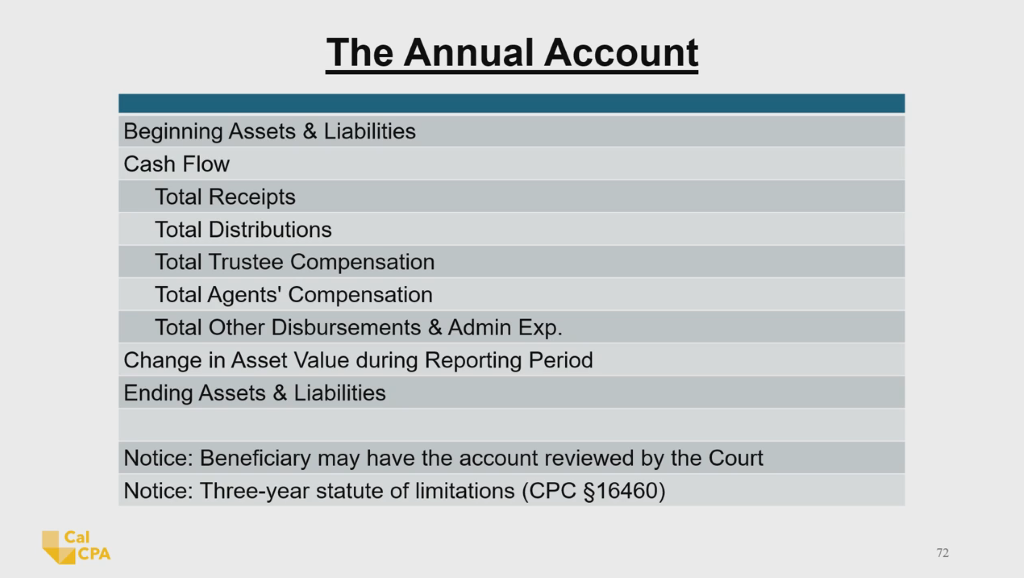Recently I attended a 2-day conference for CPAs through CalCPA on the topic of estate and trust planning. One of the more interesting topics was how to help our clients be successful successor trustees for their parent’s estate when they pass.
A successor trustee manages a trust and its assets after the trustor or appointed trustee dies, becomes incapacitated, or resigns. Successor trustees are responsible for the management of assets inside the trust, while the executor of the estate would manage assets held outside of the trust. In many cases, the same person may be executor of the entire estate as well as successor trustee of the trust, but that is not always the case.
In the past, Americans hired professionals, often the trust officer at their local bank, to carry out their trust. More and more, people are now choosing family members to be the executor or successor trustees of their estates. In most cases, these family members have never done a job like this before, have no idea where to start, and on top of that likely have their own full-time job to contend with. We have all heard, or maybe even experienced in our own families, how poor management of the estate, or even just the fact that one child is chosen over the other as executor, can destroy family relationships.
In this article I want to present an overview of what some of the duties are as a successor trustee and pass on the tips I learned for how to carry out the trust “by the books” so that you can protect yourself and fulfill this role successfully.
The rules for successor trustees are outlined in each state’s probate code. The California Probate Code (CPC) states that a successor trustee must act with prudence and provide an annual account of the trust. The CPC also provides guidelines for trustee compensation, rules for delegating duties to professionals, monitoring those agents, and notifying beneficiaries of proposed actions.
Prudence: CPC §16040: The trustee shall administer the trust with reasonable care, skill, and caution under the circumstances that a prudent person acting in a like capacity would use. This does not mean that the trustee’s decisions result in the best outcomes, it just means that the trustee must act in good faith. In order to prove that you have been prudent, you need to create a record of your decisions – what you did, why you did it, and when you did it. For example, maintaining a file with statements and your notes on different actions – or decisions on inaction.
The Annual Account: CPC §16063: The trustee shall account at least annually, at the termination of the trust, and upon change of trustee, to each beneficiary to whom income or principal is required or authorized in the trustee’s discretion to be currently distributed. Its important to understand that the beneficiaries are entitled to an accounting of how their inheritance is being handled. The Annual Account is not a court accounting – it could simply be 2 pages in an excel spreadsheet. The Annual Account should include the following:
When you provide an Annual Account, the statute of limitations clock starts, meaning the management of the estate can only be investigated for 3 years from the date of each annual account. If there is no annual account, there is no timeline on liability. The Annual account must be filed with the court and beneficiaries notified.
Trustee Compensation: CPC §15601: If the trust instrument does not specify the trustee’s compensation, the trustee is entitled to reasonable compensation under the circumstances. As you can see, there is room for a lot of subjectivity on what may constitute “reasonable compensation under the circumstances.” There are several factors listed in the code that may be considered when determining reasonable compensation and local statutes may vary by county when providing guidelines for trustee compensation. However, a couple rules of thumb do exist:
- It is not always reasonable for a CPA/JD to charge their hourly rate. The fee should not be burdensome.
- Check the local rules of court for trustee compensation.
- The individual trustee should not expect the same compensation as a bank/professional Trustee.
- An hourly rate is okay if the rate is not “too high” and the settlement is fast. You cannot “waste” funds by charging an hourly fee and taking an unreasonable amount of time for not knowing how to do the job or choosing to do tasks that are not necessary.
- For a non-professional, a 0.50% annual fee is reasonable for ongoing management. If the estate is closed within one year, there may be a higher fee for the initial administration. This 0.50% assumes that the trustee is delegating many roles such as tax prep, investment management, etc.
Manager Selection and Delegation: CPC §16052(a)(1-2): A trustee may delegate investment and management functions as prudent under the circumstances when selecting an agent and establishing the scope and terms of the delegation. If you are the successor trustee, choosing professionals to manage the trust funds is a key responsibility. Maintaining the existing advisor may not be appropriate unless they are re-evaluated. It is necessary to do due diligence by evaluating the advisor and documenting the data collected and evaluated such as:
- Using FINRA.org to do a broker check
- Reviewing the firm’s ADV filing for the following:
- Is the manager in good standing?
- Are there any complaints or settlements?
- Any felonies reported?
- What is their employment history?
Additionally, you must come up with expectations for the investment management so that you can evaluate going forward if the delegated task is being done in line with those expectations. It is not enough to hire a professional, the successor trustee has the ongoing duty of monitoring the agent as well. For example, come up with expectations for projected distributions, targeted return, and expected level of risk.
Monitoring the Agent: CPC §16052(a)(3): A trustee may delegate investment and management functions as prudent under the circumstances by periodically reviewing the agent’s overall performance and compliance with the terms of the delegation. The trustee is not acting prudently if they do not monitor the performance of those to whom they delegated responsibilities and document their findings. Investment managers should not necessarily be expected to meet or beat benchmarks, but they should be within the ballpark. It is important to have more than one benchmark as to create a range of acceptable performance. Additionally, the trusts should be managed to have sufficient liquidity to cover distributions for several years.
Notice of Proposed Action: CPC §16500 & §16053: A trustee may give a notice of proposed action or a decision not to take an action. A trustee is not liable to a beneficiary if the trustee does not receive a written objection to the proposed action from a beneficiary with the applicable period (45 days).
The reporting requirements for a trustee are outlined in the probate code and mainly includes the Annual Report. There may be additional reporting requirements written into the trust contract that the trustee must follow. Beneficiaries have the right to ask for information and the trustee has the duty to provide them with the requested information. The probate code allows trustees to purchase errors and omissions insurance to protect the successor trustee from personal liability to the beneficiaries.
I know from personal family experience how settling an estate can drive wedges in a family, especially when there is a perceived lack of transparency. Remember that when you become a successor trustee, you assume a fiduciary duty to all the beneficiaries to act in their best interests. Keeping detailed notes and preparing annual accountings as outlined in this article is a great way to maintain peace and protect yourself from liability, and heartache.
If you become the successor trustee or executor to your family’s estate, make sure you understand your duties and what is required of you in that role. There are several online courses available, from trust companies and attorneys, that provide an overview of the rights and responsibilities and how to carry out the management of the trust or estate. Use the tools available to you and seek guidance to make sure that you are protecting yourself and putting your best foot forward.




